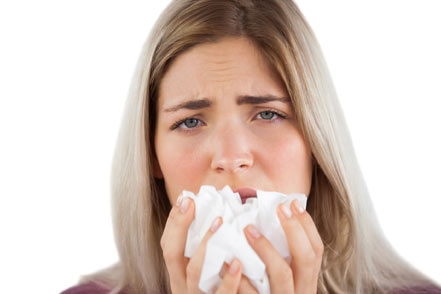
Spring is the time of year when many people complain about seasonal allergy symptoms such as runny noses, congestion, rashes, itchy and watery eyes, sneezing, coughing--and just generally feeling miserable.
Allergies occur when the immune system overreacts to a substance that doesn't bother most people. In the spring, pollen is what gets to some people. But indoor allergies--to dust mites, dust, or pet dander, for instance--can cause problems all year round.
If your allergy symptoms have you feeling lousy, this list of six allergy treatments and prevention strategies may help you find some relief:
1. Clean out your nose. Using a saltwater nose rinse is a natural option that can help clear out pollen and other irritants in the nose, says
2. Try an over-the-counter allergy medicine. In recent years, two oral antihistamines that were previously available only by prescription became available over the counter. That means you can pick up Claritin (loratadine) or Zyrtec (cetirizine) without a visit to a doctor. These medications are "good for blocking (a substance called) histamine, which causes sneezing, itching, runny nose, and watery eyes," says
If OTC antihistamines don't work for you--or your favorite allergy medication disappears from store shelves, as Drixoral has--seeing a doctor may help. Many people assume that there are no other options available, but an evaluation by a doctor can start patients on the path toward relief, Fisher says. For example, a prescription antihistamine, such as Allegra or Xyzal, is an option if Claritin or Zyrtec don't help you.
3. Consider a prescription nasal spray or eye drops. Prescription steroid nose sprays, such as Flonase and Nasonex, work by reducing swelling in the nose, which can provide relief from nasal allergy symptoms. Antihistamine nasal sprays, on the other hand, work by blocking histamine. They're like oral antihistamines, except the active ingredient is delivered directly into the nose, straight to the site of some people's most bothersome allergy symptoms. Some allergists prescribe them to patients who can't find symptom relief from oral antihistamines. Nasal-spray options include Astelin, which has been available by prescription since 1996, and Patanase and Asterpro, both approved by the
Eyedrops, such as Patanol, Optivar, and Pataday, can help soothe the itchy, watery eyes that come with allergic conjunctivitis, also known as eye allergies. All require a doctor's prescription.
4. Decongestants may also help relieve nasal congestion. A variety of decongestant medications are available without a prescription. Even if it is OTC, though, you may have to ask for your favorite medicine at the pharmacy counter if it contains pseudoephedrine, which can be used to make methamphetamine. A law that took effect in 2006 requires anyone buying a medication containing pseudoephedrine to show ID when making the purchase. An ingredient called phenylephrine has replaced pseudoephedrine in many OTC medicines, but some say they don't think it works as well at clearing congestion.
Decongestant nasal sprays are another OTC option, but don't use them for longer than three days. Overuse can create a rebound effect of narrowing and constricting the blood vessels of your nose.
5. Close your windows, and turn on the air conditioning. Sure, with the recession, keeping the A/C off and just opening your windows might be a tempting move for cost-conscious people. But if you're allergic to outdoor allergens, it's best to keep the windows shut for the sake of your health.
"If you know that the live oaks are blooming and you're sitting there all night long breathing in the live oak pollen, you're just worsening the problem," Melker says. "You're letting the fundamental (allergic) reaction occur, and then you're just trying to mask the symptoms" with medications.
6. If things get bad, try allergy shots, also known as allergy immunotherapy. There's no reason anyone should have to suffer from allergies in silence, experts say.
"Allergy shots can help a lot of the symptoms, especially when people have tried all the other stuff and are still having problems," Fisher says. These shots involve being regularly injected with a small amount of the substance you're allergic to. The idea is to stimulate your immune system and help your body become desensitized to the allergens, according to the
Eventually, the hope is that you'll build up a tolerance and your allergic reactions won't be so severe. But keep in mind that allergy shots require a time commitment--typically several years of weekly to monthly shots to completely finish the entire course of treatment. And because patients are injected with substances that they're allergic to, there is a risk of allergic reactions after the injections. For this reason, doctors typically require patients to remain in their offices for a few minutes after each session of immunotherapy.
Another option is immunotherapy delivered orally via drops or tablets, which was found in a recent study to be effective in kids with allergic asthma. A review of earlier evidence, published by the Cochrane Collaboration, found that this type of immunotherapy, delivered under the tongue, helps to relieve allergic rhinitis. It's unclear, however, whether it's as effective as allergy shots. The availability of this type of therapy is limited because it has not been approved by the


 Contact The Editor
Contact The Editor
 Articles By This Author
Articles By This Author
